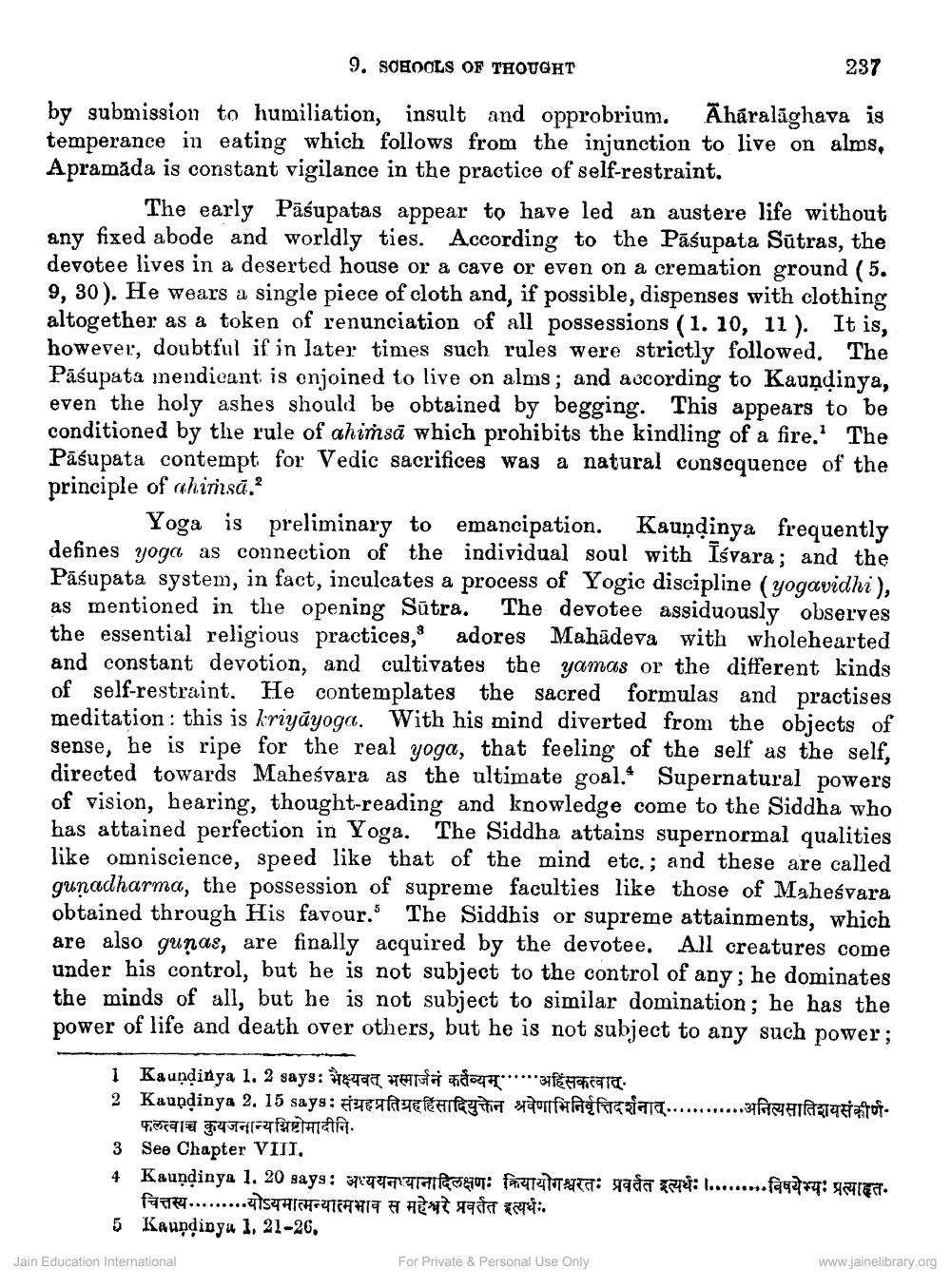________________
237
by submission to humiliation, insult and opprobrium. Äharalaghava is temperance in eating which follows from the injunction to live on alms, Apramada is constant vigilance in the practice of self-restraint.
9. SCHOOLS OF THOUGHT
The early Pasupatas appear to have led an austere life without any fixed abode and worldly ties. According to the Pasupata Sutras, the devotee lives in a deserted house or a cave or even on a cremation ground (5. 9, 30). He wears a single piece of cloth and, if possible, dispenses with clothing altogether as a token of renunciation of all possessions (1. 10, 11). It is, however, doubtful if in later times such rules were strictly followed. The Pasupata mendicant is enjoined to live on alms; and according to Kaunḍinya, even the holy ashes should be obtained by begging. This appears to be conditioned by the rule of ahimsa which prohibits the kindling of a fire.' The Pasupata contempt for Vedic sacrifices was a natural consequence of the principle of ahimsā.2
Yoga is preliminary to emancipation. Kaunḍinya frequently defines yoga as connection of the individual soul with Isvara; and the Pasupata system, in fact, inculcates a process of Yogic discipline (yogavidhi), as mentioned in the opening Sutra. The devotee assiduously observes the essential religious practices, adores Mahadeva with wholehearted and constant devotion, and cultivates the yamas or the different kinds of self-restraint. He contemplates the sacred formulas and practises meditation: this is kriyayoga. With his mind diverted from the objects of sense, he is ripe for the real yoga, that feeling of the self as the self, directed towards Maheśvara as the ultimate goal. Supernatural powers of vision, hearing, thought-reading and knowledge come to the Siddha who has attained perfection in Yoga. The Siddha attains supernormal qualities like omniscience, speed like that of the mind etc.; and these are called gunadharma, the possession of supreme faculties like those of Maheśvara obtained through His favour. The Siddhis or supreme attainments, which are also gunas, are finally acquired by the devotee. All creatures come under his control, but he is not subject to the control of any; he dominates the minds of all, but he is not subject to similar domination; he has the power of life and death over others, but he is not subject to any such power;
1 Kaundinya 1. 2 says: भैक्ष्यवत् भस्मार्जनं कर्तव्यम्
अहिंसकत्वात्.
2 Kaupdinya 2. 15 says: संग्रहप्रतिग्रहहिंसादियुक्तेन श्रवेणाभिनिर्वृत्तिदर्शनात् अनित्य सातिशय संकीर्णफलत्वाच्च कुयजनान्यग्निष्टोमादीनि.
3 See Chapter VIII.
4 Kaundinya 1. 20 says: अध्ययनध्यानादिलक्षणः क्रियायोगश्चरतः प्रवर्तत इत्यर्थः । विषयेभ्यः प्रत्याहृतचित्तस्य.........योऽयमात्मन्यात्मभाव स महेश्वरे प्रवर्तत इत्यर्थः
5 Kaundinya 1, 21-26.
Jain Education International
For Private & Personal Use Only
www.jainelibrary.org




